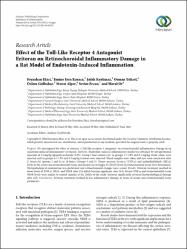Effect of the toll-like receptor 4 antagonist eritoran on retinochoroidal inflammatory damage in a rat model of endotoxin-induced inflammation

Göster/
Erişim
info:eu-repo/semantics/openAccessTarih
2014Yazar
Ekici, FeyzahanKaraca, Emine Esra
Korkmaz, Şafak
Yüksel, Osman
Gülbahar, Özlem
Alper, Murat
Ercan, Sevim
Or, Meral
Üst veri
Tüm öğe kaydını gösterKünye
Ekici, F., Karaca, E.E., Korkmaz, S., Yuksel, O., Gulbahar, O., Alper, M., Ercan, S., Or, M., (2014). Effect of the Toll-Like Receptor 4 Antagonist Eritoran on Retinochoroidal Inflammatory Damage in a Rat Model of Endotoxin-Induced Inflammation. Mediators of Inflammation, 2014. https://doi.org/10.1155/2014/643525Özet
Purpose. We investigated the effect of eritoran, a Toll-like receptor 4 antagonist, on retinochoroidal inflammatory damage in an endotoxin-induced inflammatory rat model. Methods. Endotoxin-induced inflammatory model was obtained by intraperitoneal injection of 1.5mg/kg lipopolysaccharide (LPS). Group 1 had control rats; in groups 2-3 LPS and 0.5mg/kg sterile saline were injected; and in groups 4-5 LPS and 0.5mg/kg eritoran were injected. Blood samples were taken and eyes were enucleated after 12 hours (h) (groups 2 and 4) or 24 hours (Groups 3 and 5). Tumor necrosis factor-alpha (TNF-alpha) and malondialdehyde (MDA) levels in the serum and retinochoroidal tissue and nuclear factor kappa-B (NF kappa B) levels in retinochoroidal tissue were determined. Histopathological examination was performed and retinochoroidal changes were scored. Results. Eritoran treatment resulted in lower levels of TNF-alpha, MDA, and NF kappa B after 12 h which became significant after 24 h. Serum TNF-alpha and retinochoroidal tissue NF kappa B levels were similar to control animals at the 24th h of the study. Eritoran significantly reversed histopathological damage after 24 h. Conclusions. Eritoran treatment resulted in less inflammatory damage in terms of serum and retinochoroidal tissue parameters.

















